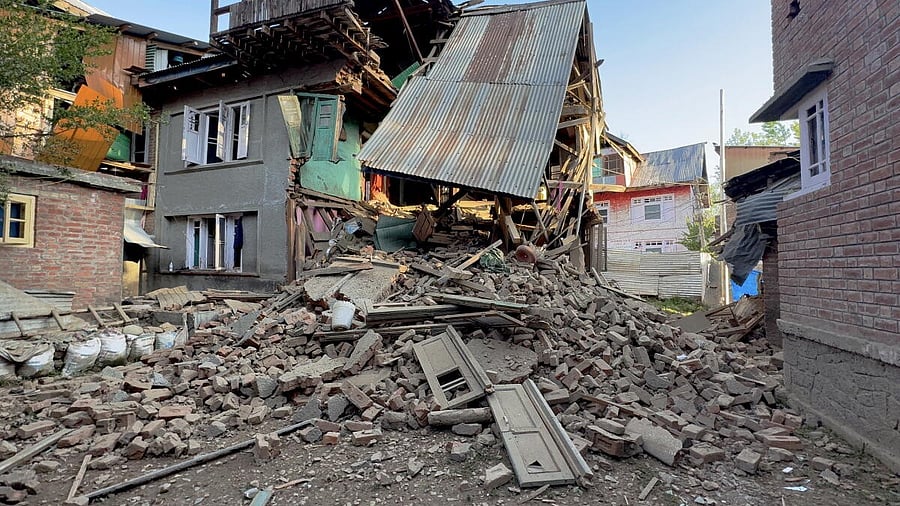
Debris of the house of LeT terrorist Adil Hussain Thokar which was destroyed after an explosion, in Bijbehara, in Anantnag district, Friday, April 25, 2025. Adil Hussain is one of the key accused in the Pahalgam massacre.
Credit: PTI Photo
Srinagar: In a chilling twist to the deadly terror attack at the scenic Baisaran meadow of Pahalgam, investigators have identified one of the masterminds as Adil Hussain Thokar — a man who once taught in classrooms, nurturing young minds, before descending into the dark world of terrorism.
Thokar, whose name has now surfaced prominently in the probe led by the National Investigation Agency (NIA), is believed to be affiliated with the Pakistan-backed Lashkar-e-Taiba (LeT). His role in orchestrating the brutal assault that claimed 26 innocent lives — mostly tourists — has sent shockwaves across Kashmir and beyond.
According to locals, Thokar, a resident of Guri village of Anantnag district in south Kashmir with a postgraduate degree, was once known as a soft-spoken teacher. “He was well-educated and taught at a private institution. No one could have imagined that someone like him would one day lead an attack of such magnitude,” they said.
Officials believe Thokar’s radicalisation was gradual but determined. “During the mid-2010s, he was frequently seen attending funerals of local militants killed in encounters,” an official said. “Amid rising tensions in the Valley, he grew increasingly disillusioned, eventually gravitating towards extremist ideologies.”
By 2018, Thokar’s transformation was complete. He travelled legally to Pakistan via the Wagah-Attari border, ostensibly for personal reasons. In reality, security officials believe, he joined the LeT’s ranks and later re-entered India covertly across the Line of Control last year and was thought to be operating in Jammu’s Doda and Kishtwar regions.
Earlier this week, Jammu and Kashmir Police named Thokar, along with two Pakistani terrorists — Ali Bhai alias Talha Bhai and Hashim Musa alias Suleman — as prime suspects in the Pahalgam massacre.
Jammu and Kashmir police identified Thoker as one of the gunmen alongside Ali Bhai alias Talha Bhai and Hashim Musa alias Suleman, who planned and executed the February 22 massacre.
“The transformation of Thokar — from an educator to an agent of death — is a stark reminder of how terrorism preys on alienation and grievance,” said a senior police official. “His education made him even more dangerous, capable of influencing and organising others.”
Thokar’s familiarity with south Kashmir’s rugged terrain is believed to have been crucial in selecting Baisaran meadow — a slightly isolated but popular tourist destination — as the target site for the attack. His operational expertise and local knowledge made him a valuable asset for the terror plot.
In the aftermath of the attack, security agencies detained Thokar’s father, Wali Mohammad and his brothers, Zahir and Sajjad, for questioning. His mother was also briefly detained.
Another suspect, Asif Sheikh, a resident of Tral in Pulwama district, has also been implicated in the conspiracy. Unconfirmed reports suggest Sheikh’s siblings and father have been detained as part of the sweeping crackdown.
In recent days, authorities have demolished the family homes of Thokar, Sheikh, and several other active militants. Officials say the demolitions aim to disrupt terrorist infrastructure and send a clear message to others still operating in the Valley.
Both Thokar and Sheikh are considered major players in the Pahalgam terror attack, marking one of the deadliest civilian massacres in Kashmir in recent years. Their affiliation with Pakistan-based groups highlights the dangerous nexus between local knowledge and foreign support, making them top targets for security forces.
As the manhunt intensifies, Kashmir remains on edge, with authorities determined to dismantle the networks behind the violence and prevent further bloodshed.